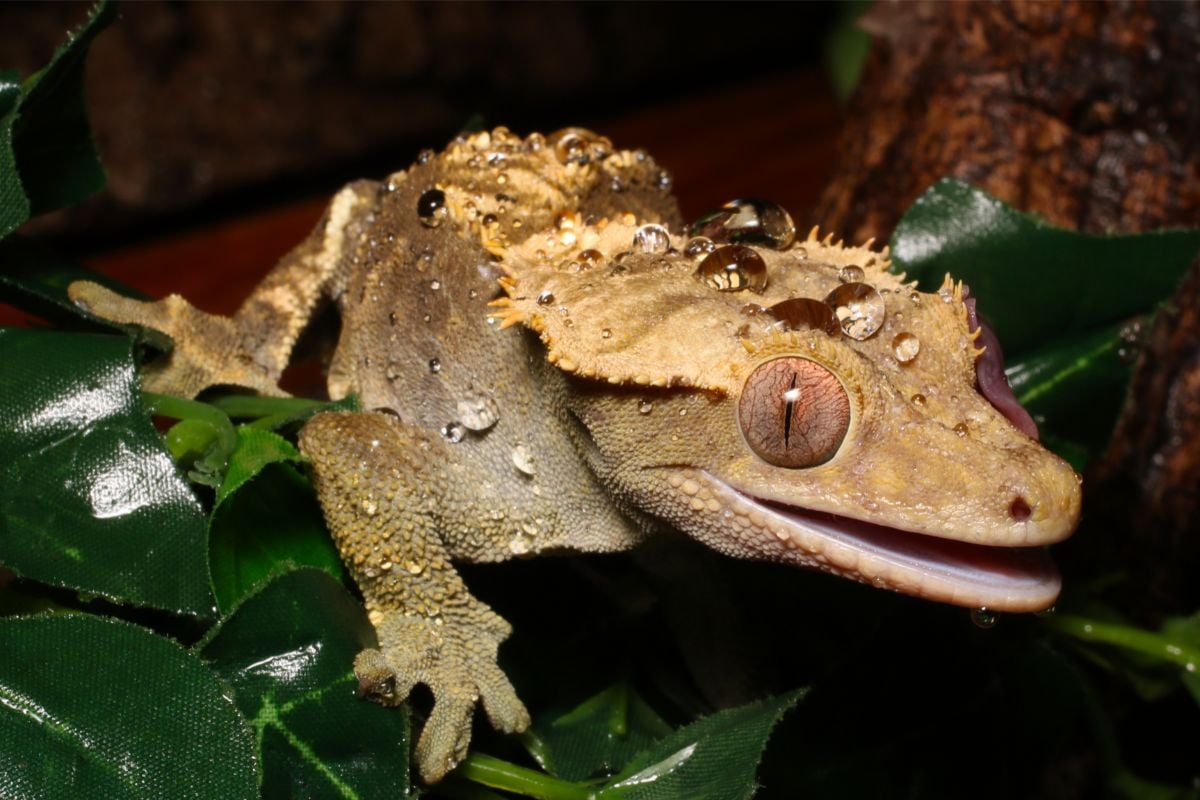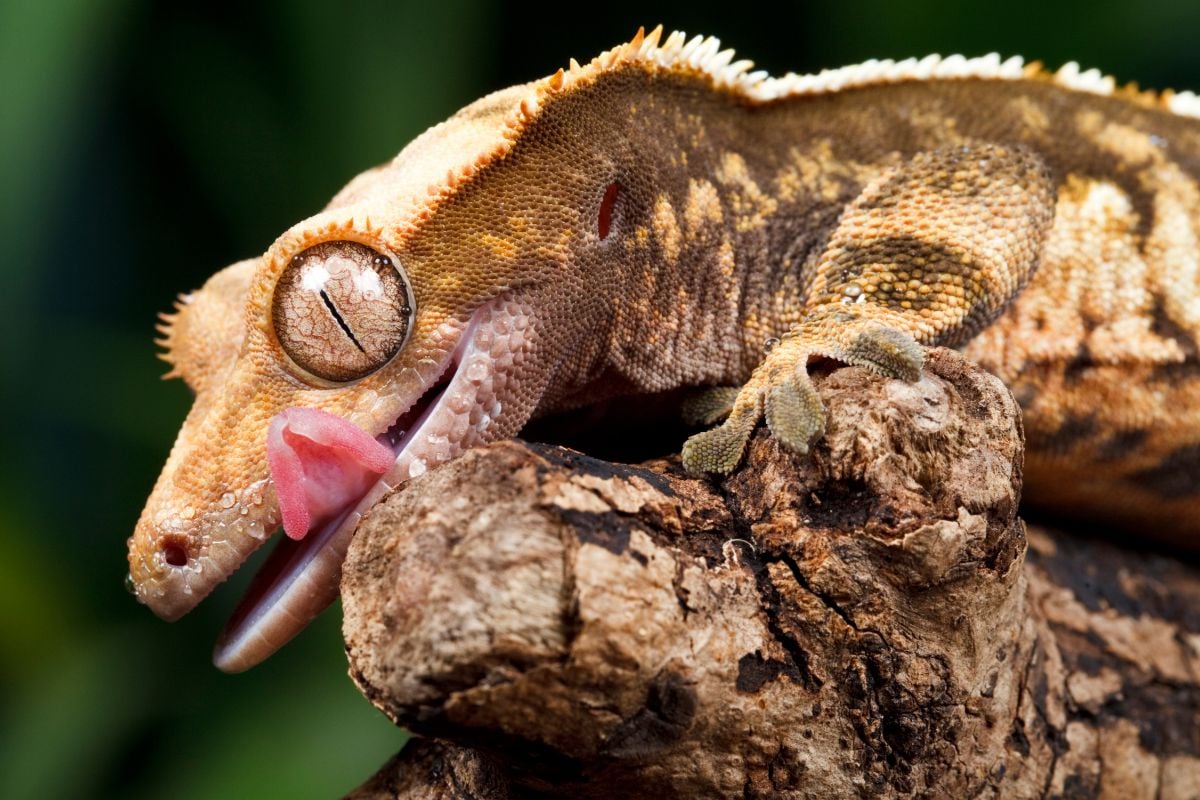When it comes to having a pet, we all try to ensure that they are properly looked after, they have a comfortable habitat and they are following a balanced and healthy diet. Of course though, unlike other pets – a crested gecko’s diet is not so obvious!

However, you’ll be pleasantly surprised to hear that they are really easy to care for and their diet is pretty simple, along with being very affordable! But it’s important to know that pet crested geckos and crested geckos in the wild have slightly different diets.
Luckily though, our guide will explain both. We’re going to explore everything you need to know about crested geckos and what they eat.
So, if you’re ready to learn more – then read on and discover the answers.
Crested Geckos In The Wild
We’ll kick off this guide by looking at what crested geckos eat in the wild. Crested geckos are omnivorous lizards, so they actually survive on a mixture of both plants and animals. Now, while little research exists for what crested geckos eat in the wild – some things are clear.
We can deduce from what we understand that, as crested geckos are nocturnal creatures, they likely feast on nocturnal insects rather than diurnal insects. Therefore, most of these will be a variety of roach species, crickets, moths and spiders.
We also know that crested geckos eat some fruits and flowers in the wild, but it’s not so clear exactly what these are.
Crested Geckos As Pets
Most people that keep crested geckos as pets will feed them live insects or commercially available lizard foods. One of these you can buy is crested gecko paste – but typically this will be fed in a cycle of paste and insects.
The best insects to feed pet crested geckos are crickets and roaches – and this should be the main staple of your crested geckos diet.
However, from time to time, you can feed your crested gecko Phoenix worms, super worms, mealworms, silkworms or waxworms.
It’s important to know though that these worms are considered treats for lizards as they can be very calorie dense and potentially lead to obesity or other health problems.
It’s also wise to note that you should only feed them worms that are the length between their eyes.
This will ensure that your gecko does not suffer from impactions. You may, however, decide to avoid worms altogether for health reasons.
Indeed, some crested gecko owners will raise their pets solely on a diet of commercially available crested gecko food. However, this is a contentious issue. Some experts believe that this isn’t good for them as a “full time” diet.
Yes, you will find that the majority of crested gecko owners and reptile experts believe that a crested gecko should receive some insect prey in their diet – even if it does not make up the majority of it – to ensure a long and healthy life.
However, it’s important to know that this assertion is not yet proven. The fact is, it is unclear what is best or what works for a crested gecko – but the general consensus is that a diverse diet will provide the best nutritional benefits and avoid deficiencies.
Young Crested Gecko Diet

The good news is that young crested geckos survive off the same diet as adult crested geckos do. Be sure to provide them with a diverse diet inclusive of live insects, plants and perhaps some worms as a treat.
One important thing to remember when it comes to young crested geckos though is that their food may need to be slightly smaller to avoid impaction.
Many keepers of crested geckos will tell you that they feed young crested geckos primarily insect-based diets so that they can grow more quickly and be better placed when they are fully grown adults (likely as insects are a great source of protein).
Something that we must point out here though is that recent hatchlings commonly refuse food for several days after they have hatched. This is because they are still surviving from the resources provided from the egg yolk.
Following their first shed, which is around five days later – they usually start to feed as normal.
How To Feed Crested Gecko
It’s pleasing to know that feeding a crested gecko isn’t a difficult task, but it’s critical to know that it’s not just a case of throwing in a load of crickets into the tank and hoping for the best. Correct preparation and presentation of their food is very important.
Before feeding your crested gecko insects, it’s always a good idea to feed the insects a high quality diet for around 24 hours before you present them to the gecko. This gives the insects much more nutritional value for the gecko when they eat them.
As a result, a crested gecko will benefit from the insects’ “healthy gut”. The process is known as gut-loading and it essentially mimics the way that crested geckos will “get their vegetables” in their diet. For long term health, this step is vital.
Luckily, you can buy pre-made gut load if you do not have the time to feed the insects before feeding your crested gecko. However, if you wish to do it yourself, then you simply need to feed the insects with dark and leafy greens.
It’s important to remember that, while crested geckos usually get the majority of their water from their food sources, they still should have a water source in their vivarium to ensure they have a healthy brain, liver and kidneys.
The Bottom Line
And that’s everything you need to know. Having a crested gecko and feeding them right is pretty simple, but you need to make sure that you’re following the right guidelines so they maintain a healthy body and mind.
- Can Leopard Geckos Eat Silkworms? - March 11, 2024
- Do Leopard Geckos Climb? - March 4, 2024
- Do Leopard Geckos Bask? The Answer Will Surprise You - February 21, 2024
